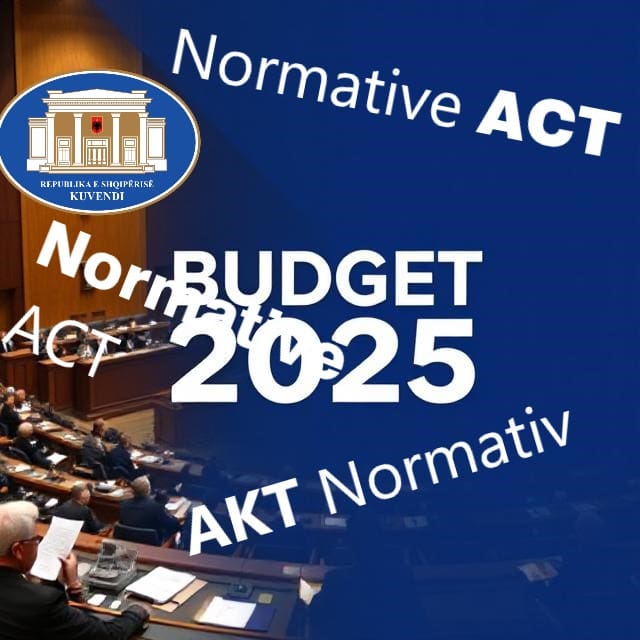Budget changes in 2025 through Normative Acts and the risk of deviating from fiscal discipline
The 2025 budget in Albania was changed three times through normative acts: once during the electoral campaign (before May 11, 2025), once in June 2025, and a third time in October 2025. These changes, accompanied by ongoing issues identified by the Supreme State Audit (alb. KLSH), such as deficiencies in planning and implementation of capital expenditures, high concentration of funds at the end of the year, and questionable allocations to institutions outside the budget or to public and private companies without full legal basis, raise serious questions regarding fiscal discipline and the integrity of the budget process.
This analysis evaluates the practices of planning and distributing the 2025 budget, the importance of correct implementation of budgetary policies, the legal violations of normative acts, and the lack of transparency in fund allocation, providing a comprehensive overview of challenges and recommendations for the future.
Evaluation of Budget planning and distribution in 2025
The threefold changes to the 2025 budget through normative acts indicate a reactive and insufficient approach to public financial planning. According to available data, the revised budget reallocated 11.8 billion lek, including 3 billion lek for sovereign guarantees in agriculture, reflecting a lack of foresight regarding sectoral needs during the initial phase of budget drafting.
Frequent changes turn the budget from a strategic development instrument into a tool for short-term political management. This approach undermines macroeconomic stability, especially in a context where public debt is targeted to gradually decrease until 2029 and public investments are planned to increase by over €2 billion in loans.
Frequent changes create uncertainty for investors and international institutions, such as the IMF or the EU, which require fiscal discipline to support Albania’s European integration. Furthermore, the lack of public consultations for these changes reduces transparency and accountability, undermining citizens’ trust in public fund management.
This reflects structural weaknesses in the budget process, where changes during the year, particularly in the electoral period, turn the budget into a short-term electoral policy tool, lacking a long-term fiscal strategy and increasing uncertainty in the execution of public projects.
Importance of planning and correct implementation of Budget policies
Proper planning and implementation of the budget are essential for transparency, efficiency, and fiscal accountability. KLSH has identified structural problems, such as non-compliance with public procurement rules and the concentration of expenditures at the end of the year, which lead to economic losses and failure to achieve developmental objectives.
For example, 2024 audits show that violations in concession management and the lack of fiscal risk analysis resulted in financial damages that could have been avoided with better planning.
A properly planned and implemented budget directly impacts the improvement of public services, such as education, healthcare, and infrastructure, and supports the long-term goals of sustainable development.
The concentration of capital expenditures at the end of the year not only reduces project quality but also hinders balanced regional development, favoring certain areas for political reasons. This practice conflicts with EU fiscal governance standards, which require predictability and stability to ensure funding for major projects.
Moreover, the lack of accurate planning increases the risk of hidden debt, especially through public-private partnership (PPP) contracts, which KLSH has criticized for a lack of transparency.
The recurring deficiencies identified by KLSH indicate that the problem is systematic and require a review of the public financial management model, focusing on realistic forecasting, uniform execution throughout the year, and increased institutional accountability.
Legal violations of Normative Acts and changes during the Electoral Campaign
The June 2025 normative act, justified by the “slowdown of implementation due to the electoral situation,” violates the constitutional criteria set out by the Constitutional Court rulings no. 24/2006 (Alb.) and no. 23/2014 (Alb.). According to Article 101 of the Constitution, normative acts are allowed only for unforeseen and urgent circumstances, such as natural disasters or economic crises. The electoral situation, being a planned process, does not meet these criteria, rendering the act unconstitutional and an overreach of executive powers.
The use of normative acts to bypass Parliament undermines the principle of separation of powers and weakens the Parliament’s role in overseeing public finances. This practice, particularly during the electoral campaign, raises suspicions of political motives, as budget reallocations can be used to gain electoral support through the funding of populist projects, such as the 3 billion lek allocated to agriculture.
These decisions not only damage the integrity of the electoral process but also create a dangerous precedent for abuse of executive power. In similar contexts, organizations such as the Central Election Commission (CEC) and the Supreme State Audit (KLSH) have criticized such changes for lack of transparency and potential influence on voters. The changes made in June 2025 through the normative act are inconsistent with the spirit of the Constitution and the principles of the rule of law.
During election periods, the use of this instrument creates strong doubts about the misuse of public funds for electoral purposes, undermining the credibility of fiscal governance and damaging political competition fairness, making parliamentary oversight and immediate post-election audit essential.
Budget fund allocation to institutions and companies and lack of transparency
The case of the transfer of 1 billion lek (approximately €10 million) to “Thinking Machines Lab” through the Albanian Investment Corporation (KISH), without an investment decision approved by Parliament and without following the procedures of the laws on commercial companies, strategic investments, and public procurement, is a flagrant example of lack of transparency and accountability.
This allocation without legal basis highlights the bypassing of institutional control mechanisms and creates room for abuse and favoritism. This case reflects a broader problem of using public corporations, like KISH, to channel funds without proper oversight.
The Law on Strategic Investments requires an open and competitive process for large projects, while the Public Procurement Law aims to ensure efficiency and fairness in the use of funds. Circumventing these procedures not only violates the law but also risks the economic efficiency of the investment, particularly since high-tech projects require detailed feasibility analyses to guarantee return on investment.
Similar examples of controversial allocations outside legal procedures in the 2025 budget include the transfer of €30 million as capital transfer to Albcontrol, an off-budget institution, due to operational difficulties following account blockages.
These allocations, made through the October 2025 normative act, bypass standard budgetary and procurement procedures, creating a precedent for arbitrary distribution of public funds without parliamentary approval, increasing the risk of abuse and lack of accountability.
Distributing funds in this manner is a direct violation of public financial management principles and undermines budget transparency, creating a dangerous precedent that allows significant funds to flow to public or semi-public structures without parliamentary oversight, potentially leading to abuse, conflicts of interest, and lack of fiscal responsibility.
Towards a sustainable and transparent Budget for 2026
The experience of the 2025 budget highlights the urgent need for a reformed approach to the budget process, ensuring stability, transparency, and full compliance with the legal framework.
To achieve this, the government must correctly implement a long-term budget strategy based on in-depth economic analyses and realistic forecasts to avoid frequent and reactive interventions.
This strategy should include broad consultations with experts, civil society, and stakeholders to ensure that the budget reflects the country’s real needs rather than temporary political priorities.
Parliament should take a more active role in overseeing public finances by creating a special committee to review normative acts and strategic investments, strengthening parliamentary control and preventing abuses by the executive.
Transparency in fund allocation is essential to restore public trust. Any budget reallocation, including those via public corporations like KISH, should be accompanied by detailed public reports and comply with public procurement procedures to ensure efficiency and fairness in resource use.
KLSH and the CEC should be granted greater authority to investigate and sanction budgetary violations, particularly during electoral periods, to prevent the use of public funds for electoral purposes.
Finally, the budget process should be aligned with EU fiscal governance directives, limiting hidden debt from public-private partnerships and increasing transparency in public investments to support Albania’s European integration perspective.
The 2025 budget revealed deep weaknesses in Albania’s fiscal discipline, from poor planning and frequent changes through normative acts to controversial allocations without legal basis, such as the “Thinking Machines Lab” case.
These practices not only violate the legal and constitutional framework but also damage public trust, economic stability, and the prospect of European integration.
For 2026, the government and institutions must build a sustainable, transparent, and law-based budget, learning from the mistakes of 2025 to restore fiscal discipline and support the country’s long-term development.
A reformed budget process, grounded in predictability, accountability, and public participation, will be key to transforming public finances from a tool of political maneuvering into an instrument of sustainable development.




Leave a Reply
You must be logged in to post a comment.